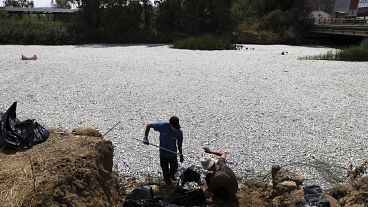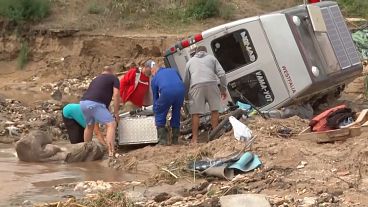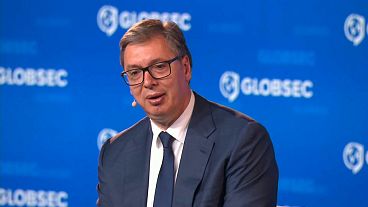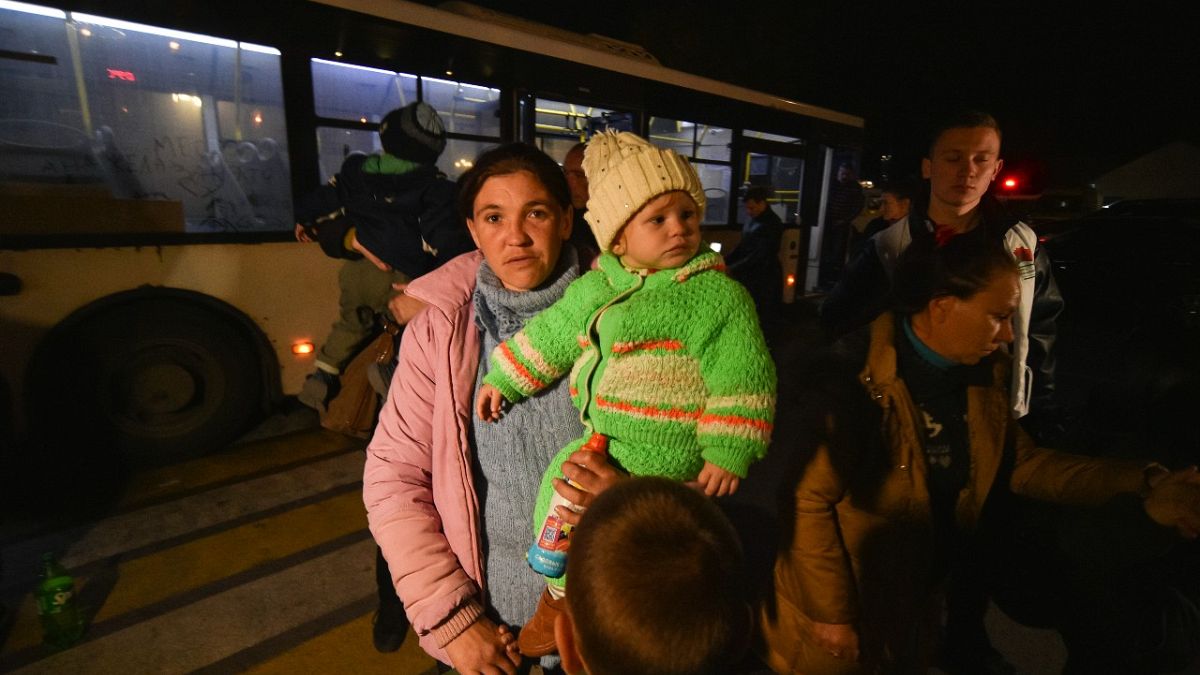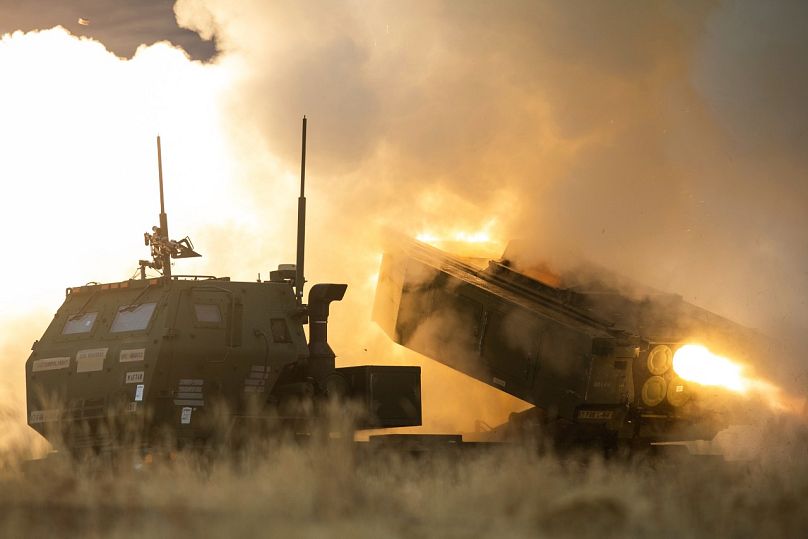Here's our round-up of the latest news from Russia's war in Ukraine.
1. Kherson still 'part of Russia' and withdrawal 'not a humiliation' — Kremlin
Moscow still considers the entire Kherson region including its capital to be part of Russia despite the withdrawal of the Russian army, the Kremlin said on Friday.
Kherson and three other Ukrainian regions were declared to belong to Russia after local "referendums" were held in September – votes that were denounced by Kyiv and Western governments as illegal and coercive.
The Kherson region "is a subject of the Russian Federation," Kremlin spokesman Dmitry Peskov said. "There can be no change."
His comments came as Russia's defence ministry said that its troops had completed their pullout from the city -- a move announced on Wednesday -- redeploying them to the left bank of the Dnipro River.
Peskov refuted comments that the withdrawal was humiliating for President Vladimir Putin. "No", he said when challenged. "The special military operation continues."
The spokesman added that the Kremlin did not regret holding a festive ceremony more than a month ago to celebrate the incorporation of Kherson and three other Ukrainian regions into Russia.
He redirected all other questions about the withdrawal to the defence ministry.
Peskov also said that Putin's absence from the upcoming G20 summit in Indonesia is related to his necessity to be in Russia.
2. Zelenskyy says new US military aid 'just what we needed'
Volodymyr Zelenskyy has welcomed Washington's announcement of another batch of American military aid. In his daily video address late on Thursday, the Ukrainian president said the new US air defence systems are “just what we needed, what we asked for”.
The United States will send $400 million (€389 million) more in military aid to Ukraine, US officials said earlier.
It comes amid concerns that financial assistance for the war against Russia could decline if Republicans take control of Congress. Counting is still ongoing after Tuesday's US midterm elections.
The Pentagon says the aid package will contain large amounts of ammunition and, for the first time, four highly mobile Avenger air defence systems. Included is ammunition for HIMARS (High Mobility Artillery Rocket Systems), which Ukraine has been successfully using in its counteroffensive against Russia.
There also will be Stinger missiles for the Avenger system, missiles for the Hawk surface-to-air anti-aircraft system, 10,000 mortar rounds, thousands of artillery rounds for howitzers, 400 grenade launchers, 100 Humvees, cold weather gear and 20 million rounds of ammunition for smaller, individual guns and rifles.
“This increased air defence will be critical for Ukraine as Russia continues to use cruise missiles and Iranian-made drones to attack critical civilian infrastructure," said US national security adviser Jake Sullivan.
Sabrina Singh, a Pentagon spokeswoman, said she did not know when the systems would get to Ukraine or how long the training would take.
The US will buy 100,000 rounds of howitzer artillery from South Korean manufacturers to provide to Ukraine, a US official said on Thursday, in a deal the two governments have been working on for some time.
3. UN begins talks with Russia on Black Sea grains deal
Talks between a Russian delegation and senior United Nations officials to address Moscow's grievances about the Black Sea grains export initiative began in Geneva on Friday, a UN spokesperson said.
The negotiations come just eight days before the deal brokered by the United Nations and Turkey in July is due to be renewed. The accord has helped stave off a global food crisis by allowing the export of food and fertilisers from several of Ukraine's Black Sea ports.
Moscow has indicated that it is prepared to quit the deal, which could expire on 19 November, if progress is not made on its concerns. Russia suspended its participation in late October but rejoined after four days.
It said it was responding to a drone attack on Moscow's fleet in Crimea that it blamed on Ukraine. Kyiv has not claimed responsibility and denies using the grain programme's security corridor for military purposes.
UN aid chief Martin Griffiths, who heads talks on Ukrainian exports, and senior UN trade official Rebeca Grynspan, were meeting with Russia's Deputy Foreign Minister Sergei Vershinin at the UN office in Geneva, a UN spokesperson said.
"This discussion, it is hoped, should advance progress made in facilitating the unimpeded export of food and fertilisers originating from the Russian Federation to the global markets," Alessandra Vellucci told a news briefing.
Vellucci made no mention of whether an extension of the pact was on the agenda.
4. Wagner to train militias and build fortifications 'to defend Russia'
The head of Russia's Wagner paramilitary group said on Friday that his organisation is to train militias and build fortifications in two regions bordering Ukraine in order to "defend" Russia.
The new activities have begun in Belgorod and Kursk, Yevgeny Prigozhin was quoted by his company's Concord press service as saying. The Russian regions have been regularly hit in recent months by strikes which Moscow has blamed on the Ukrainian army.
"He who wants peace, prepares for war. You must always be ready to defend your land," Prigozhin added.
Since 2014, Wagner mercenaries have been accused of serving the interests of Vladimir Putin's regime in numerous conflict zones, ranging from Syria to Ukraine, Africa and South America.
In recent months, the group has been actively supporting the Russian army in its war against Ukraine. It has been accused of going around Russia's prisons recruiting prisoners to fight in Ukraine in exchange for reduced sentences.
Prigozhin -- known as "Putin's chef" for hosting dinners attended by the Russian leader and other Kremlin officials -- admitted in September founding the paramilitary organisation after years of denial. This week he also boasted of having conducted electioneering operations in the US.
He is now operating openly in Russia, amid a military mobilisation in the country after the Russian army's defeats on the front line. A new headquarters of the Wagner "Private Military Company" was recently opened with great fanfare in a large glass building in St Petersburg.
5. Environmental toll from war will 'take years to clean up'
Environmental damage from the eight-month-old war with Russia is mounting in more of the country, with experts warning of long-term consequences.
Moscow's attacks on fuel depots have released toxins into the air and groundwater, threatening biodiversity, climate stability and the health of the population.
Because of the war, more than six million Ukrainians have limited or no access to clean water, and more than 280,000 hectares (nearly 692,000 acres) of forests have been destroyed or felled, according to the World Wildlife Fund.
The war has caused more than $37 billion (€35.9 billion) in environmental damage, according to the Audit Chamber, a nongovernmental group in the country.
“This pollution caused by the war will not go away. It will have to be solved by our descendants, to plant forests, or to clean the polluted rivers,” said Dmytro Averin, an environmental expert with Zoi Environment Network, a non-profit organization based in Switzerland.
The damage has spread elsewhere from the hardest-hit industrial eastern regions of Donetsk and Luhansk, where fighting has been going on since 2014.
“In addition to combat casualties, war is also hell on people’s health, physically and mentally,” said Rick Steiner, a US environmental scientist. The health impact from contaminated water and exposure to toxins unleashed by conflict “may take years to manifest”, he said.
In recent weeks, Russia has targeted power plants and waterworks. But even in July, the UN’s environmental authority already was warning of significant damage to water infrastructure.
A soon-to-be-published paper by the Conflict and Environment Observatory, a British charity, and the Zoi Environment Network, found evidence of pollution at a pond after a Russian missile hit a fuel depot in Kalynivka, about 30 kilometres southwest of Kyiv.
The pond, used for recreation as well as a fish farm, showed a high concentration of fuel oil and dead fish on the surface -- apparently from oil that had seeped into the water. A copy of the report was seen by the Associated Press.
Nitrogen dioxide, which is released by burning fossil fuels, increased in areas west and southwest of Kyiv, according to an April report from REACH, a humanitarian research initiative.
Ukraine's agriculture sector, a key part of its economy, also has been affected. Fires have damaged crops and livestock, burned thousands of hectares of forest and prevented farmers from completing the harvest, said Serhiy Zibtsev, a forestry professor at Ukraine’s National University of Life and Environmental Sciences.
“The fires are so massive," he said, adding that farmers “lost everything they were harvesting for winter.”


